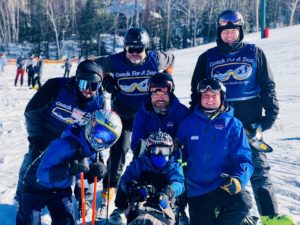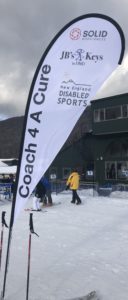JB Harvey broke his personal record earlier this winter by skiing over 22 trails in a single day at Loon Mountain. It was an awesome day. And 22 runs would be a huge day for anyone, but it was particularly so for JB, as he’s an 11-year-old with Duchenne Muscular Dystrophy (DMD).
He skied with three coaches, of which I was a lucky team member, in a sit-ski that enables him to initiate turns by leaning his body to each side while we use tethers attached to the device for control down the mountain. We were all exhausted at the end of the day, but left with a wonderful sense of accomplishment reflected in our big smiles. JB crushed it, like he does most weekends at Loon.
JB’s time on the ski slopes helps provide an outlet for a very positive, engaged quality of life – he leaves the terrestrial boundaries of his electric wheelchair for the fast and exhilarating experience of skiing. We go all over the mountain together, ripping turns with an occasional yell of “booyah” excitement.
For JB and many others, adaptive sports are a life-changing pursuit – contributing to their confidence, liberating them from some of life’s limitations, fostering independence, and allowing them to share in the joy of the mountains.
For me, being involved with the New England Disabled Sports adaptive program at Loon combines my professional and personal passions with a sense of purpose: as a biotech investor focused on helping to advance new therapeutics for a wide-range of conditions, as well as a passionate snow sports enthusiast, I’m incredibly inspired by seeing the impact of these adaptive sports pursuits on the lives of many with disabilities.
As I’ve written in past blogs, there’s a wonderful complementarity around the innovative work being done in the biotech field with what I witness on the slopes. In the past, I’ve shared some of the highly impactful student-athlete vignettes and adaptive sports themes, both blogs still super relevant and poignant today. I’ve had the pleasure of skiing with students presenting with a huge range of disabilities, including DMD, spina bifida, cerebral palsy, epilepsy, Prader Willi, polio, multiple sclerosis, autism, Tourette’s, Down’s, etc…
In the biotech sector, the important mission around “patient-centricity” is often done somewhat at arms-length or in a transitory fashion. Undoubtedly, corporate advocacy group liaisons have good connectivity to the patient and caregiver communities they are trying to assist. Many companies, big and small alike, have patients come and speak with their teams. Our firm, Atlas Venture, frequently has patients speak with our Limited Partners at our annual meetings. These are all important and good things to do, especially in putting a face on the science we’re advancing.
But spending meaningful “real” time with the families and individuals we are trying to help with our new therapies is actually very rare. Without it, it’s hard to embrace the full picture that goes way beyond the loss of dystrophin, destruction of myelin, or addition of a chromosome. Adaptive sports has changed that for me, and for many others. I’d love to see this very complementary biotech-adaptive relationship broaden in its connectivity to the biotech community.
With that in mind, this year NEDS launched our “Coach For A Day” (C4AD) program, the brainchild of adaptive coach Cathal McGloin, a father of a girl with cerebral palsy who has been actively involved in NEDS for years. With C4AD, we host a group of up to 12 skiers or snowboarders for a full immersion weekend in adaptive sports. On Friday, we train them about what it’s like to be an adaptive coach and participate in an experiential learning process on the mountain. They ride in the various sit-skis, feeling what it’s like to be a student. A boy like JB Harvey, for instance, will often sit in a “Mountain Man” bi-ski – so we give C4AD participants the chance to ride down the slope in one of these. If they are up for it, we coach them in how to tether a crash-proof dummy (named Joey) down the mountain in one of these devices as well. After a day of training, they join us on Saturday to “shadow” actual full-day lessons with students of various disabilities, being able to observe how we interact with our students and the joy on their faces.
This winter we’ve hosted 12+ person teams from DMD-focused Solid Biosciences for several weekends, and I had a the pleasure of coaching Eytani, the son of co-founders Annie and Ilan Ganot, on his first-ever morning of skiing (captured here, worth seeing last few seconds of this video).  With us on the mountain were Eytani’s “shadow” coaches from Solid, Carl Morris and Alvaro Amorrortu, who are CSO and COO of the company, respectively. Truly an awesome experience for us and for the team at Solid, captured with “one of those weekends we will never forget.” During the planning last fall, they renamed the Solid Biosciences’ events as “Coach For A Cure” weekends – reflecting the powerful synergy of adaptive sports and biotech coming together.
With us on the mountain were Eytani’s “shadow” coaches from Solid, Carl Morris and Alvaro Amorrortu, who are CSO and COO of the company, respectively. Truly an awesome experience for us and for the team at Solid, captured with “one of those weekends we will never forget.” During the planning last fall, they renamed the Solid Biosciences’ events as “Coach For A Cure” weekends – reflecting the powerful synergy of adaptive sports and biotech coming together.
We’ve also had the pleasure of both hosting fantastic teams from Wave Life Sciences (also involved in therapies for DMD, as well as many other conditions) and Colliers/J Calnan (with the biotech teams from these real estate and construction firms). All three of these firms have generously supported NEDS in our inaugural year for C4AD.
 Importantly, the family of our record-breaking athlete, JB Harvey, started a non-profit nine years ago, called “JB’s Keys to DMD”, that provides things like adaptive sports scholarships. This season JB’s Keys was able to support twenty DMD families skiing at NEDS, and I had the pleasure of working with several of them. In light of both Solid’s and Wave’s interest in DMD, it was great to have so many DMD athletes joining us at NEDS in coordination with the C4AD programming.
Importantly, the family of our record-breaking athlete, JB Harvey, started a non-profit nine years ago, called “JB’s Keys to DMD”, that provides things like adaptive sports scholarships. This season JB’s Keys was able to support twenty DMD families skiing at NEDS, and I had the pleasure of working with several of them. In light of both Solid’s and Wave’s interest in DMD, it was great to have so many DMD athletes joining us at NEDS in coordination with the C4AD programming.
These weekends have been great reminders of the powerful role of sports in breaking boundaries – across organizations and within teams, as well as for the individuals we serve.
Everyone that’s been involved in these C4AD programs comes away with the same sense of inspiration and connection shared by many in the adaptive sports community. But it’s especially powerful for those of us also in the biomedical field – as it brings the human element into our day to day work in translating science into medicine. In last year’s blog, I captured it well so I’ll just repeat it here:
“Fundamentally, patient-centricity is all about putting the human element first. It’s about living it. It’s not a 9-to-5 job. Living and breathing with purpose is the essence of a great and inspiring organizational culture. Finding ways of marrying your personal passions with your professions can unlock this positivity”
We hope to be able to expand this C4AD programming next year to a broader group of biopharma companies; please reach out if your organization is interested in participating in a C4AD weekend.
Please also consider donating to support NEDS and it’s adaptive sports efforts – breaking barriers and changing lives of those affected by disabilities.





